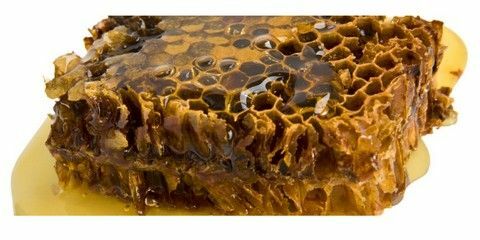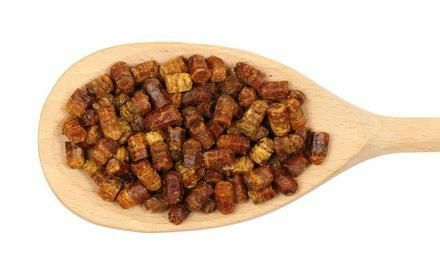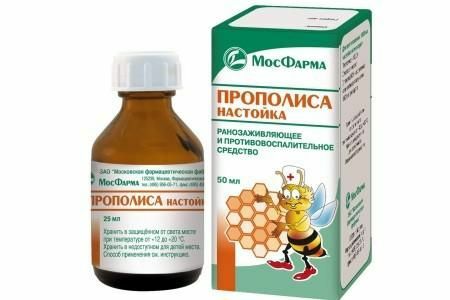- Biological properties of propolis
- Methods of application of propolis for cough
- Contraindications
Propolis or bee glue is one of the products of the life of bees, possessing valuable biological properties. It is a resinous mass that the bees produce from sticky substances collected from the kidneys of various trees, most often from poplar, alder, aspen or birch. This product has a pleasant floral aroma and a bitter taste. Depending on the source of production, it differs in color, smell and chemical composition. Bees use bee glue to cover the inner walls of the hive and honeycomb for the purpose of disinfection, protection from pests, pathogenic bacteria, mold fungi, and also cold.

Since a long time propolis has been used in folk medicine, especially for the treatment of colds accompanied by inflammation of the nasopharynx and cough. Propolis from cough is considered a good alternative or addition to traditional medicines created on the basis of chemicals. This remedy can be used with caution in treating colds even in children.
Biological properties of propolis
Propolis has a very complex and unstable chemical composition, depending on the type of plants from which the resin was collected, the state of the bees, the climate, the season, the location of the hive and other factors. Until now, all components of this product have not yet been fully identified. The bulk of propolis is made from vegetable resins, waxes, essential oils and tannins. The percentage of resins can vary from 40 to 60%.Among other components in propolis were found:
- vitamins;
- proteins;
- microelements;
- organic acids;
- alcohols;
- flavonoids;
- amino acids, etc.

The wide spectrum of the activity of bee glue activity is caused, first of all, by a diverse composition of biologically active components that enhance and complement each other's action. The effectiveness of the use of propolis from cough, with colds, with ulcer of the stomach and duodenum, inflammation in the mouth, in the treatment of wounds, ulcers and burns on the skin and other diseases is due to the fact that it:
- reduces inflammation;
- has a bactericidal, antiviral and fungicidal action;
- accelerates the healing and regeneration of tissues;
- promotes the excretion of poisons and toxins from the body;
- has an analgesic effect;
- is a powerful antioxidant and immunomodulator.
Propolis with an advanced cough with antibacterial drugs helps to prevent the development of dysbacteriosis and the need to restore normal microflora. Another property of this bee product is the ability to enhance the action of certain antibiotics, which accelerates the recovery of the patient.
Important: Propolis is a highly effective natural antibiotic. Its main advantages are safety, selectivity of action in relation only to pathogenic microorganisms and the lack of formation of resistance to its action in pathogens even with prolonged use.
Methods of using propolis with cough
Treatment of cough with propolis can be carried out in various ways: by rinsing, inhalation, rubbing, internal intake of infusions. Recipes are used where propolis is used alone or in combination with medicinal herbs and other products. With a cold, sore throat and cough, this bee product can be used alone or in combination with medications and physiotherapy procedures. In addition, this tool can be used not only for treatment, but also for the prevention of colds in the autumn-winter period.
Important: Cough can be a symptom of a variety of diseases, including cardiac and nervous system pathologies. The use of folk remedies, even if the cause of the cough is accurately established, should be agreed with the attending physician to prevent complications.
Propolis chewing gum
Propolis chewing is the simplest and does not require a special treatment. To prepare this chewing gum, a small piece of pea size and weight from 1 to 3 grams should be separated from the total mass of the bee glue. The chewing time of one piece should be about 15 minutes, then take a break for 2 hours. Repeat this procedure is recommended up to five times a day.
Rinses
In case of catarrhal diseases with the use of propolis from cough, the recipe for rinsing is effective, which is prepared in this way:
- Propolis is placed in a small saucepan and poured with steep boiling water at the rate of 100 ml of water per 10 g of raw material.
- The resulting mixture is boiled over a low heat until propolis completely dissolves.
- Solution is cooled and used for rinsing up to 15 times a day.
Rinse solutions based on bee glue can also be prepared using its alcohol tincture, which can be bought at any pharmacy. To do this, 1 tsp. The drug is diluted in a glass of boiled water. To treat coughing with rinses, the following recipe is also effective:
- St. John's wort( one tablespoon) is poured with a glass of boiling water and left to infuse in a warm place for 15 minutes.
- Then gradually cool and filter.
- 50 drops of propolis tincture are added to the resulting solution and used for rinsing.
Inhalation
Cough propolis can be used in the form of aerosol inhalations. To prepare them, propolis is ground and filled with hot water( 50 ml of raw material requires 350 ml of water).The resulting mixture is placed for 15 minutes on a minimum fire. Then the pan is removed from the plate, bent over it and deeply inhaled by the couple, covered with a large towel or blanket. The procedure is repeated in the morning and evening.
Important: The propolis solution prepared for inhalation can be used up to 10 times, each time heating it to produce steam.

Rubbing
On the basis of bee glue, it is possible to prepare an ointment for rubbing the chest. To obtain such a remedy, propolis and fat will be needed, which will serve as an ointment base. As fat, you can use bear, badger, goose or the most common butter. To prepare the ointment, the bee product and fat are combined in a ratio of 1 to 5, and then kept in a water bath, periodically mixing until a uniform consistency is obtained. Raziraniya spend at night. This method of using propolis will suit children from coughing, since rinsing and inhalation can be difficult for them.
Propolis with milk
Warm milk, especially with the addition of honey, is a long-known folk remedy for the treatment of colds and coughs. It has a soothing, soothing, enveloping and warming effect, contributes to the sputum discharge. Treatment of cough in children with propolis and milk quickly alleviates the condition, relieves irritation of the mucous throat, improves breathing with nasal congestion and promotes calm sleep when applied overnight. To prepare this medicine, use water or alcohol tincture of propolis( 10 drops) and a glass of warm milk.

Alcohol tincture of propolis is prepared by the following method:
- 5 g propolis is ground and 50 ml of ethanol containing 70% ethanol is added to it.
- The resulting mixture is left for 10 days in a dark cool place, periodically shaking.
- After 10 days, tincture is filtered, poured into a sealed container and placed in a refrigerator.
Water propolis tincture was prepared by standing in a water bath for 45 minutes 30 g of raw material and 100 ml of purified distilled water. After that, the mixture is cooled, filtered and placed in a sealed storage bottle in the refrigerator.
To improve the taste of such a milk drink, you can add honey or a little sugar.
Recommendation: Preparing propolis for the treatment of colds and other diseases is necessary in the autumn period, when bees produce the maximum amount. Keep the product in a dry and clean well-closed glass jars.
Contraindications
Despite all its useful properties and naturalness, the use of propolis has a number of contraindications. These include, in the first place, the presence in the history of any allergic reactions. With caution this bee product is used to treat people with high blood pressure and diabetes, children, women during pregnancy and lactation.
Absolute contraindications to the use of propolis are:
- individual intolerance;
- pollinosis;
- urticaria;
- bronchial asthma;
- allergic rhinitis;
- eczema;
- diathesis.
